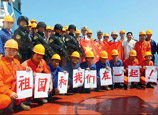
The government had set a target of 10 percent growth for exports and imports last year, but it seems the goal will be missed, according to officials.
Increasing imports are helping China raise consumption.
Wei said he believes China will adopt a more proactive attitude in multilateral and bilateral trade negotiations.
"It has become a trend that countries are trying to abandon the multilateral framework and step up efforts in strengthening bilateral mechanisms," he said.
A free-trade agreement between the United States and South Korea took effect in 2012, with agreement on eliminating 95 percent of each nation's tariffs on goods within five years.
The European Union has completed final negotiations on a free-trade agreement with Singapore.
Under such circumstances, as a key Asian trading partner, China also needs to step up negotiations, and could consider establishing a free-trade agreement with the US, Wei said. The US replaced the EU as China's biggest trading partner in 2012.
More credit financing support will be given to enterprises, but unlike in the past, when such financing was frequently used to develop affiliated businesses such as real estate, more supervisory measures will be put in place, Wei said.
Enterprises will also see significant reductions in costs for logistics, customs, transportation and quarantine.
Dampened by weak demand in major markets, some of China's export-reliant companies have improved their innovative capability and exploration in new markets. However, the external environment remains pessimistic for China's imports and exports.















 Black-headed gulls come to Kunming for winter
Black-headed gulls come to Kunming for winter


![]()
